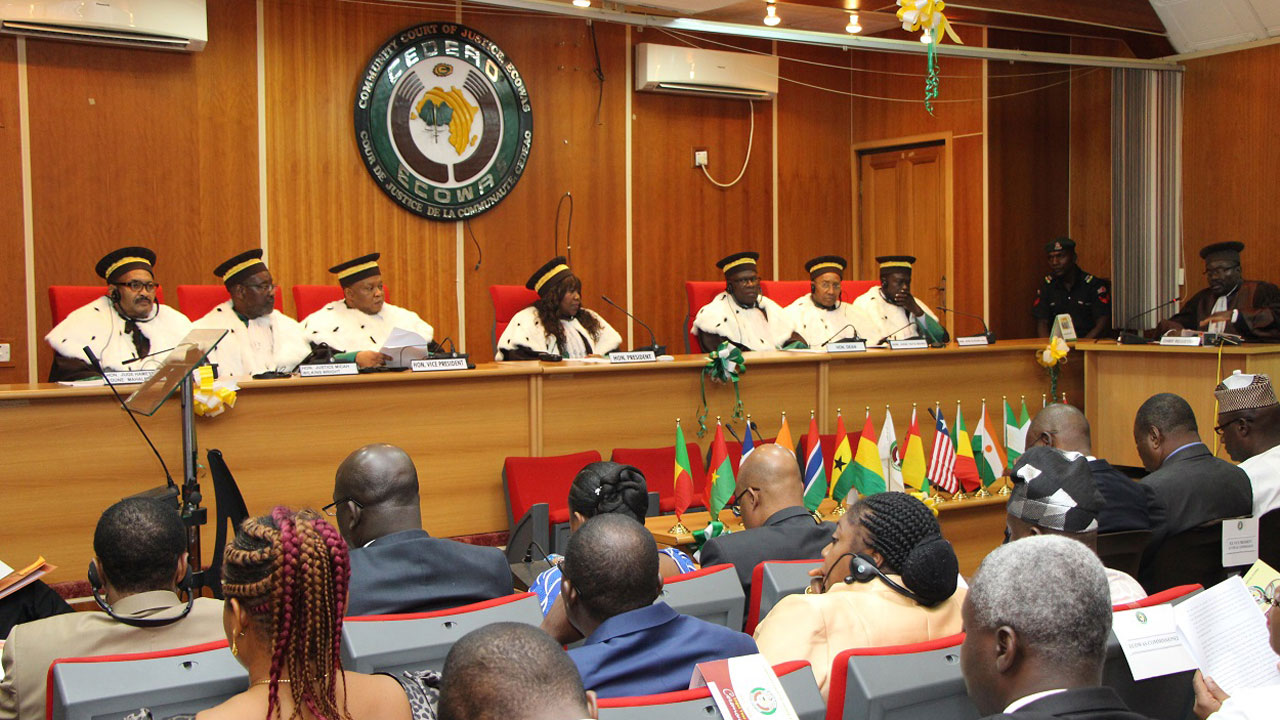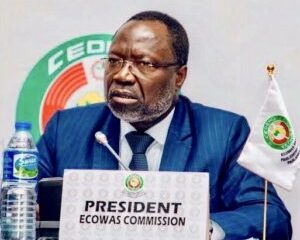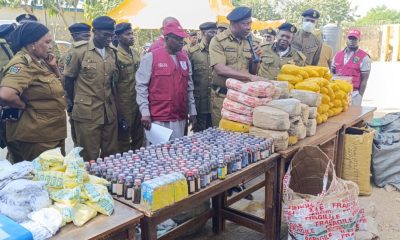Africa
ECOWAS Court mulls legal aid fund to help indigent victims

The ECOWAS Court of Justice is mulling setting up a Legal Aid Fund to assist indigent community citizens who cannot afford legal representation, a Judge of the court, Justice Dupe Atoki has disclosed.
Atoki in an address at the two-day joint retreat organised by the Court and the UN Refugee Agency, (UNHCR), the judge said that the fund would be a “milestone achievement“ for the ECOWAS region as it would contribute to improving access to the court.
The plan is contained in a statement made available to newsmen on Thursday in Abuja.
According to the statement, Atoki, who led a delegation of the court to a retreat, said the 20-year-old court has so far received a total of 559 cases, from which it had delivered 130 rulings and 301 judgments.
She told the gathering that most of the rulings and judgments were related to the human rights mandate of the court.
She said the court continued to receive more complaints daily.
Atoki said despite the court’s laudable achievements, many ECOWAS citizens were unaware of its existence and were, therefore, unable to access it for the protection of their rights.
According to her, this explains why the court has put in place strategies to give itself more visibility.
“The court has intensified efforts to enhance awareness of its existence through its external court sessions, the online publication of its judgments and in the law reports of the court for dissemination within and outside the region.
“In addition, the court has undertaken sensitisation missions to member-states to raise awareness of key stakeholders about court’s work.
“The court collaborates with international organisations such as the UNHCR, with which it signed an initial Memorandum of Understanding (MoU) in 2015, amongst others, to improve on the protection of human rights,” she explained.
However, the judge said that like other victims of human rights violations, the lack of awareness was among the factors inhibiting refugees, migrants, internally displaced persons and stateless people to petition the court as it concerns the violation of their rights by member-states.
In his remarks at the opening, the Deputy Director for Protection of the UNHCR, Mr Xavier Ceach, said that judges, lawyers and other legal practitioners played a critical role in the social change.
He said that their role to advance refugee protection could not be disputed as the legal community has over the years been at the forefront of the refugee case law, as well as legal and normative reform interpretation or court decisions.
Ceach, who has responsibility for West and Central Africa, noted that many ECOWAS member-states had initiated law reforms on asylum, drafting of legal and normative frameworks on asylum, protection of Internally Displaced Persons or nationality law or civil documentation.
While acknowledging that the adoption of a new law or revisiting it progressively was not an absolute solution to all problems, the UNHCR official said that the court could contribute to the promotion of a regional asylum and solutions framework.
He advised ECOWAS member-states to implement the 1993 Revived Treaty and all other subsidiary legal instruments that impacted the persons of interest to the UNHCR.
“It is through the implementation of these instruments, he said, that refugees and other persons of concern to UNHCR would be able to voice their plight, secure protection and support and find their way towards greater stability.
Ceach described the ECOWAS Court as ‘an increasingly active and bold adjudicator of human rights,’ which since it acquired its human rights jurisdiction in 2005, has issued numerous decisions condemning human rights violations by its member-states.
However, he noted that the court has been faced with significant challenges in providing redress to persons of concern to UNHCR manifested in the noticeably low number of applications filed on asylum and statelessness related issues.
“This might be attributed to a variety of factors such as the limited visibility of the court in member-states; the limited knowledge and awareness of the mandate of the court; the lack of jurisprudence on international refugee law and human rights law, as well as barriers to access to justice.
“That is the reason why I find this retreat timely, for it offers the opportunity to explore ways to broaden cooperation by identifying new areas of engagement, based on mutual interest and consequently provide protection for the rights of persons of concern,” he said.
The retreat, which is being attended by two judges of the Court and 18 other staff, will evaluate the UNHCR-ECCJ partnership to identify the gaps, challenges, and opportunities for improved synergies to build a more operational and efficient partnership.
It will also agree on ways to enhance the role of the ECOWAS Court in upholding the protection of the human rights of refugees, asylum seekers, internally displaced persons, stateless persons and those at risk of statelessness in the region.
The retreat is being moderated by Prof. Tawfiq Ladan, the Director-General of the Nigerian Institute of Advanced Legal Studies. (NAN)
Africa
When the Gatekeeper Fumbles: JAMB’s Error and the Future of Our Youth

When the Gatekeeper Fumbles: JAMB’s Error and the Future of Our Youth
By Matthew Eloyi
It is not every day that a public official publicly sheds tears. And so, when the Registrar of the Joint Admissions and Matriculation Board (JAMB), Professor Ishaq Oloyede, broke down while admitting to errors in the conduct of the 2025 Unified Tertiary Matriculation Examination (UTME), it was a deeply emotional moment. But make no mistake: while the tears may have reflected remorse, they cannot wash away the consequences of what is, quite frankly, a systemic failure.
Let us be clear — JAMB is not merely an examination body. It is a gatekeeper to higher education in Nigeria. It is the bridge between dreams and their realisation for millions of young Nigerians. To fumble that responsibility is not a technical error; it is a breach of trust with life-altering consequences.
With nearly 380,000 candidates now required to retake the exam due to technical glitches and irregularities, one cannot help but ask: How did we get here? And more importantly, why does this keep happening?
For years, JAMB has marketed its transition to computer-based testing as a step toward modernisation. Yet each year seems to expose new cracks in its implementation — from faulty computer systems and power outages to incomplete biometric verification and poorly configured questions. These are not unforeseeable anomalies. They are predictable outcomes of poor planning, lack of oversight, and inadequate investment in infrastructure.
Imagine the psychological toll on the students, many of whom studied day and night, only to be met with malfunctioning systems and flawed questions. Some walked out of examination halls in tears, their confidence shattered, their futures placed in limbo. For those in remote or under-resourced areas, the technical errors are compounded by infrastructural and economic disadvantages. What we are witnessing is not just an exam failure; it is an institutional failure that amplifies inequality.
JAMB’s decision to allow affected candidates a resit is necessary, but it is insufficient. What about those who may never realize they were victims of the glitch? What about those whose faith in the process has been irreparably broken?
Professor Oloyede’s tears may have been sincere, but what Nigerian students need now is not emotion — it is accountability. Heads must roll, systems must be overhauled, and the entire structure must be audited. We cannot allow a body that plays such a pivotal role in shaping the nation’s intellectual future to operate with such recklessness.
The UTME is a rite of passage for Nigerian students; it should not become a roulette of misfortune. Until JAMB can guarantee a glitch-free, fair, and standardised assessment, its credibility will remain on shaky ground.
In the end, our children deserve better. They deserve an education system that works; not one that breaks down and apologises after the damage is done.
Africa
ECOWAS Confirms Burkina Faso, Mali, Niger’s Exit, Keeps Doors Open for Return

The Economic Community of West African States (ECOWAS) has confirmed that the withdrawal of Burkina Faso, Mali, and Niger from the regional bloc takes effect from January 29, 2025.
ECOWAS spokesperson Joel Ahofodji, in a statement on Wednesday, said the decision aligns with the ECOWAS authority’s resolution and reflects the spirit of regional solidarity and the interests of the people.
Despite their exit, Ahofodji emphasized that the bloc remains open to the return of the three Sahel nations whenever they choose.
“All relevant authorities within and outside ECOWAS Member States should take note of this development,” he said.
To minimize disruptions, ECOWAS urged the continued recognition of national passports and identity cards bearing the ECOWAS logo held by citizens of Burkina Faso, Mali, and Niger until further notice.
Additionally, the commission called for the continued application of the ECOWAS Trade Liberalisation Scheme (ETLS) and investment policies for goods and services from the departing nations. It also stressed that their citizens should retain the right to visa-free movement, residence, and establishment under existing ECOWAS protocols.
Furthermore, ECOWAS requested full support and cooperation for its officials from the three countries as they continue their assignments.
“These arrangements will be in place until the full determination of the modalities of our future engagement with the three countries by the ECOWAS Authority of Heads of State and Government,” Ahofodji stated.
He revealed that ECOWAS has set up a structure to facilitate discussions on these modalities, ensuring a smooth transition.
“This message is necessary to avoid confusion and disruption in the lives and businesses of our people during this transition period,” he added.
The News Agency of Nigeria (NAN) reports that Burkina Faso, Mali, and Niger initially announced their intention to leave ECOWAS on January 29, 2024, in accordance with the bloc’s protocol, which allows for a 12-month notice period. In December 2024, ECOWAS officially acknowledged their right to exit but reiterated its willingness to welcome them back in the future.
Africa
Customs hands over illicit drugs worth N117.59m to NDLEA

The Nigeria Customs Service (NCS), Ogun Area 1 Command, has handed over illicit drugs worth N117.59 million to the National Drug Law Enforcement Agency (NDLEA).
The Comptroller of the command, Mr James Ojo, disclosed this during the handing over of the drugs to Mr Olusegun Adeyeye, the Commander of NDLEA, Idiroko Special Area Command, in Abeokuta, Ogun, on Friday.
Ojo said the customs handed over the seized cannabis and tramadol tablets to the Idiroko Special Command for further investigation in line with the standard operating procedures and inter-agency collaboration.
He said the illicit drugs were seized in various strategic locations between January and November 21, 2024, in Ogun State.
He added that the illicit drugs were abandoned at various locations, including the Abeokuta axis, the Agbawo/Igankoto area of Yewa North Local Government Area, and Imeko Afton axis.
Ojo said that the seizure of the cannabis sativa and tramaling tablets, another brand of tramadol, was made possible through credible intelligence and strategic operations of the customs personnel.
“The successful interception of these dangerous substances would not have been possible without the robust collaboration and support from our intelligence units, local informants and sister agencies.
“These landmark operations are testament to the unwavering dedication of the NCS to safeguard the health and well-being of our citizens and uphold the rule of law,” he said.
He said the seizures comprised 403 sacks and 6,504 parcels, weighing 7,217.7 kg and 362 packs of tramaling tablets of 225mg each, with a total Duty Paid Value of N117,587,405,00.
He described the height of illicit drugs smuggling in the recent time as worrisome.
This, he said, underscores the severity of drug trafficking within the borders.
“Between Oct. 13 and Nov. 12 alone, operatives intercepted a total of 1,373 parcels of cannabis sativa, weighing 1,337kg and 362 packs of tramaling tablets of 225mg each,” he said.
Ojo said the seizures had disrupted the supply chain of illicit drugs, thereby mitigating the risks those substances posed to the youth, families and communities.
He lauded the synergy between its command, security agencies and other stakeholders that led to the remarkable achievements.
Ojo also commended the Comptroller General of NCS for creating an enabling environment for the command to achieve the success.
Responding, Adeyeye, applauded the customs for achieving the feat.
Adeyeye pledged to continue to collaborate with the customs to fight against illicit trade and drug trafficking in the state.
-

 Headlines4 years ago
Headlines4 years agoFacebook, Instagram Temporarily Allow Posts on Ukraine War Calling for Violence Against Invading Russians or Putin’s Death
-

 Headlines4 years ago
Headlines4 years agoNigeria, Other West African Countries Facing Worst Food Crisis in 10 Years, Aid Groups Say
-

 Foreign3 years ago
Foreign3 years agoNew York Consulate installs machines for 10-year passport
-

 News1 year ago
News1 year agoZero Trust Architecture in a Remote World: Securing the New Normal
-

 Entertainment3 years ago
Entertainment3 years agoPhyna emerges winner of Big Brother Naija Season 7
-

 Headlines1 year ago
Headlines1 year agoNigeria Customs modernisation project to check extortion of traders
-

 Entertainment2 years ago
Entertainment2 years agoMovie download platform, Netnaija, announces closure
-

 Economy2 years ago
Economy2 years agoWe generated N30.2 bn revenue in three months – Kano NCS Comptroller















